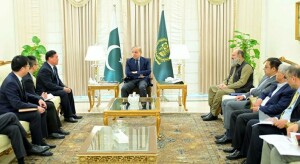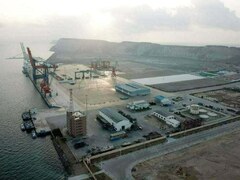As discussion in the Senate on President Musharraf's address to the Parliament continued on Friday the past of the Pakistani politics, with all its ugliness, dominated the speeches by senators from both the sides of the aisle.
The president's expositions on various national issues were seen through the prisms of party affiliations.
Mushahid Hussain Syed's was departure from the trend, however. Instead of being hostage to the political polarisation of the past let us look to the future, was his theme.
He lamented absence of rules of the game in politics of Pakistan, which led the players to seek shortcuts, precipitating martial laws. Political adversaries nudged military to take sides and grab power in 1977 at the head of "Get Bhutto" movement, who then hanged Bhutto whose "trial was political to remove a political rival".
But 1999's was an English medium martial law". We all must join hands to strengthen democracy "otherwise if Musharraf goes another general will come".
To the great embarrassment of nationalist leaders Mushahid put it that PONM is not a "dangerous creation". Within days if its birth the first person the PONM leaders called on the then army chief General Jehangir Karamat and when General Pervez Musharraf took over they were the first to meet him.
He said all the governments of Pakistan have been fully supportive of country's nuclear programme, but Benazir Bhutto's contradictory statements that "I was out of the loop on nuclear and then assertion that I was part of it and I decided that enrichment level be lowered", is puzzling.
As for allegation of nuclear proliferation he cited US analyst Stephen Cohen who recently rejected the notion that Pakistan transferred nuclear technology to North Korea because this would have angered China which Islamabad cannot afford.
Turkey used parliament to neutralise US pressure for troops in Iraq; Lebanon resisted pressure with the help of parliament and the unanimous resolution by the parliament deflected American pressure to join coalition force, Mushahid pointed out.
"Parliament is to become relevant and the present one is most representative since 1970's". And as regards the National Security Council he advised a non-military orientation of the set-up.
Mushahid lauded the Muttahida Majlis-i-Amal (MMA) decision to support the Legal Framework Order (LFO), arguing political compromises could have averted the break up of Pakistan in 1970 and martial law in 1999. "We have to have democratic mindset...let's live and let live".
The otherwise smooth debate had its ups and downs. Soon after the House met the opposition staged token walkout protesting poor law and order situation in Karachi reflected as it was in the murder of the two girls. There was exchange of hot words between the PPPP parliamentary leader Rabbani and Senate Chairman Muhammedmian Soomro, with the former protesting that treasury member Kamil Ali Agha was given floor for 37 minutes against his share of 10 minutes. Soomro contended he had the discretion as regards time allocation, Rabbani contested that position.
Agha's long speech was nothing but a charge-sheet of accusations against the MMA and PML-N.
That earned him the shouting of "Lota, lota" since he was once part of PML-N and was supposed to be part of all the good or bad that
happened during Nawaz Sharif's tenure.
PML-N's parliamentary leader Ishaq Dar, in his 30-minute speech, furiously attacked the present government's economic policies. But his assertions in the areas of politics and foreign policy were equally smashing.
He said President Musharraf's case that Pakistan faced four dangerous charges stemmed from the general's own fears, and "in fact these are non-issues". He repeated his claim that the war consequent to 9/11 incident has caused Pakistan losses worth over $12 billion.
Dar said Finance Minister Shaukat Aziz's visit of Kahuta on June 12, 2003 was the beginning of the rollback of Pakistan's nuclear programme. He rejected the charge of nuclear proliferation from Pakistan, but narrated how a "pseudo- intellectual general", a reference to former COAS General Mirza Aslam Beg, asked the then prime minister Nawaz Sharif to transfer nuclear technology to Iran. But Nawaz Sharif turned down that request with contempt by saying that an elected government would never do that. However, "We will stand by the government to defend the nation's nuclear programme".
He laughed at the president's accusation of corruption by former rulers, demanding an honest audit of defence budget.
He also rejected various figures presented by the present government in support of its claim that economy has improved and its dealings are transparent. "We must stand up to protect our national interests. Pakistan today is facing serious challenges and it is time of nation-building agenda", Dar concluded.
The opposition to the foreign policy being pursued by Musharraf-Jamali combine is overwhelming in the Parliament and to defend it in the House by the government is becoming increasingly difficult.
After a few treasury members had spoken, half-heartedly and with failing conviction, the opposition would come to dominate by fielding one more fiery, as well as well informed speaker. MMA's Syed Murad Ali Shah's turn came towards the end of the sitting.
He said Musharraf's address found positive response where it was not expected. Speaking in Karnal (in India) Advani commented that had the Pakistani leader made the same speech at Agra there would have been definitely a move forward.
Centcom Chief General John Abizaid also welcomed Musharraf's speech. Then, Shah asked why you do not call US a terrorist state where a murder takes place every eight minutes and KKK is on the loose to kill and maim people at will; India faces 16 secessionist movements and its troops in occupied Kashmir are setting new record of savagery and France is not prepared to let girls wear Hijab.
The debate is moving towards its conclusion. But who is listening to it. A couple of ministers were present in the morning, but then they disappeared, one by one. No one seems to be taking notes of the suggestions made by the senators. Also, the sittings have no set timeframe. It is hoped that the entire exercise is not just "they came, they talked, they dispersed".
BR100
7,864
Increased By
25.8 (0.33%)
BR30
25,594
Increased By
134 (0.53%)
KSE100
75,312
Increased By
381 (0.51%)
KSE30
24,200
Increased By
53.9 (0.22%)





















Comments
Comments are closed.